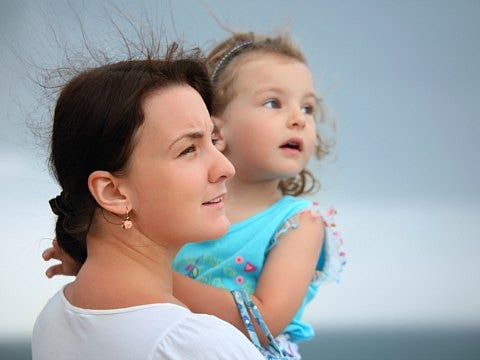Oklahoma Tornado: Helping Your Kids Cope In A Natural Disaster
How do you help your kids deal with large-scale tragedies without scaring them?

This week, a tornado as big as two miles wide swept across the state of Oklahoma, flattening neighborhoods and separating families. As of Tuesday morning, authorities confirmed 24 deaths (including nine children) and dozens of more people injured. And while the communities are left in the aftermath to pick up the pieces, how do we explain these tragic events to our children? Natural disasters like these conjure up feelings of stress, overwhelm, grief and despair.
Yet as parents, we try to either shield our children from the truth or expect them to be compliant while we "work through our adult emotions." The only problem is, our kids aren't wired that way. Small children—even tweens—have not developed a strong enough sense of reasoning and empathy to be able to mourn with us, and they certainly cannot expect to remain sullen and still for long periods of time while events unfold around them. In times of tragedy or panic, adults forget that kids learn about the world around them through childish behaviors like play and pretend. It's not reasonable to expect your 4-year-old son to remain "well behaved and sit quietly" when everyone else is grieving. What you can do is allow your son or daughter to do what comes naturally to a child: run and jump to release all that energy, play with toys and friends, ask tons of questions and help when asked!
If we plan for the inevitable and prepare for our children's natural needs and actions, we can breathe deeper and not be so snappy and irritated when our kids respond to life like kids instead of miniature adults. With those things in mind, the best plan if you have kiddos to tend too during a disaster is to plan ahead and be prepared:
Tell your child only what is age-appropriate information. A 2-year-old does not need to know that you may lose power or anything like that. They only need to know that a storm is coming, they need to stay close to you and you will keep them safe. Additionally, a first grader does not need gory details about death and destruction. A plan of action is always better than fear of harm.
Ask your child to help you prepare. If you are getting ready for a storm, collect candles, blankets, food, etc. If you are preparing for a service or to go to a shelter or help with clean up, make a list of everything you need and let your child help you to fill it. Keep reading...
More parenting advice from YourTango:
Additionally, pack a duffle bag with your child's favorite things. Yes, you'll need the storm-prep materials of blankets and batteries, but don't neglect things like toys, small games, books, drawing materials, stuffed animals and snacks. If your child has a hand-held game, this is not the time to flip out about time limits. If it calms your child, it will calm you—remember that always!
If you are collecting items for donation, involve your child in the process. Let them pack boxes, choose items of their own to donate, even help with delivery. Children are very caring and want to help when they are able. Notice if your child is getting too emotional over a specific item that you may need to let them hold on too for a while. The reality of other children losing their things may be getting to them and they will need a break.
Let your children be children. Most importantly, if your children want to play, retreat to be alone or act disengaged, let them have their space! Kids need frequent breaks from overly stimulating activities in order to process what is going on and deescalate. Always comfort them with a rub on the back or some words of encouragement to let them know you are there for them. Don't force them to be in sadness or despair with you. Play is a stress-reliever for kids. And who knows? Maybe if you got in there and played with them, you'd feel a heck of a lot better too?

